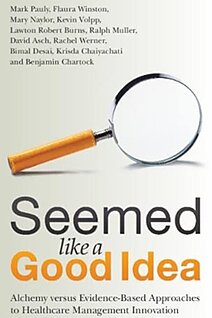Why has the health sector of the economy uniquely resisted changes in products, productivity, and services that improve consumer satisfaction or reduce prices and spending? One reason, according to the book Seemed Like a Good Idea: Alchemy versus Evidence‐Based Approaches to Healthcare Management Innovation, is that decisionmaking on medical delivery or insurance innovations is often not evidence‐based and sometimes contradictory to evidence. This book explores reasons why the health sector lacks such evidence and why managers often don’t use the evidence that does exist. Please join us for a discussion with the authors and Cato director of health policy studies Michael F. Cannon that will explore government policies that cause producers and consumers to leave money on the table.
Lunch will be served at 11:30 AM.




